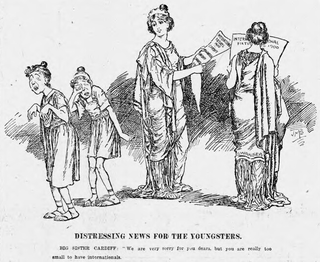
Lansdowne Road Stadium was a stadium in Dublin owned by the Irish Rugby Football Union (IRFU) that was primarily used for rugby union and association football matches. The stadium was demolished in 2007 to make way for the Aviva Stadium on the same site, which opened in 2010.

Frederick Louis MacNeice was an Irish poet, playwright and producer for the BBC. His poetry, which frequently explores themes of introspection, empiricism, and belonging, is considered to be among the greatest of twentieth century literature. Despite being renowned as a member of the Auden Group, he was also an independently successful poet with an influential body of work, which is replete with themes ranging from faith to mortality. His body of work was appreciated by the public during his lifetime, due in part to his relaxed but socially and emotionally aware style. Never as overtly or simplistically political as some of his contemporaries, he expressed a humane opposition to totalitarianism as well as an acute awareness of his roots.
Events from the year 1941 in Ireland.
Events in the year 1911 in Ireland.
Jon Howie Stallworthy, was a British literary critic and poet. He was Professor of English at the University of Oxford from 1992 to 2000, and Professor Emeritus in retirement. He was also a Fellow of Wolfson College, Oxford, from 1986, where he was twice acting president. From 1977 to 1986, he was the John Wendell Anderson Professor of English at Cornell University.
The Leinster Senior Cup is a major rugby competition in Ireland, involving all senior rugby clubs in Leinster, i.e., clubs from Leinster competing in the All-Ireland League. From 2006 until 2016 it was known as the Leinster Senior League Cup during the period when the Leinster Senior League had been discontinued, but reverted to its traditional name for the 2016–17 season upon the revival of the Senior League. From 2011 to 2016 only the top senior teams competed and those in the lower divisions of the All-Ireland League competed for the Leinster Senior League Shield.

Hugh Patrick MacNeill OBE, commonly known as Hugo MacNeill, is a former rugby union player who played for Ireland, Leinster, the French Barbarians and the British and Irish Lions during the 1980s. During the late 1970s he also played soccer for University College Dublin and Dublin University. After retiring from sport, MacNeill went on to serve as a director for Goldman Sachs. He has also worked as a rugby pundit for TV3 and BBC Radio 5 Live.
The 1893 Home Nations Championship was the eleventh series of the rugby union Home Nations Championship. Six matches were played between 17 January and 11 March. It was contested by England, Ireland, Scotland and Wales. In winning all three matches, Wales won the Championship for the first time and also took the Triple Crown.
The 1898 Home Nations Championship was the sixteenth series of the rugby union Home Nations Championship. Five matches were played between 5 February and 2 April 1898. It was contested by England, Ireland, Scotland and Wales.

The 1899 Home Nations Championship was the seventeenth series of the rugby union Home Nations Championship. Six matches were played between 5 January and 18 March. It was contested by England, Ireland, Scotland and Wales.

The 1900 Home Nations Championship was the eighteenth series of the rugby union Home Nations Championship. Six matches were played between 6 January and 17 March. It was contested by England, Ireland, Scotland and Wales.

That part of the United Kingdom called Northern Ireland was created in 1922, with the partition of the island of Ireland. The majority of the population of Northern Ireland wanted to remain within the United Kingdom. Most of these were the Protestant descendants of settlers from Great Britain.

The Earth Compels was the second poetry collection by Louis MacNeice. It was published by Faber and Faber on 28 April 1938, and was one of four books by Louis MacNeice to appear in 1938, along with I Crossed the Minch, Modern Poetry: A Personal Essay and Zoo.

Zoo is a book by Louis MacNeice. It was published by Michael Joseph in November 1938, and according to the publisher's list belongs in the category of belles lettres. It was one of four books by Louis MacNeice to appear in 1938, along with The Earth Compels, I Crossed the Minch and Modern Poetry: A Personal Essay.

"Carrickfergus" is a 44-line poem by Louis MacNeice. It was written in 1937 and first published in book form in MacNeice's poetry collection The Earth Compels (1938). The poem reflects on MacNeice's childhood in Carrickfergus, a large town in County Antrim, Northern Ireland. Although the title of the poem is "Carrickfergus", the text of the poem refers to "Carrick", as the town is known locally and colloquially.

The Sunlight on the Garden is a 24-line poem by Louis MacNeice. It was written in late 1936 and was entitled Song at its first appearance in print, in The Listener magazine, January 1937. It was first published in book form as the third poem in MacNeice's poetry collection The Earth Compels (1938). The poem explores themes of time and loss, along with anxiety about the darkening political situation in Europe following the outbreak of the Spanish Civil War. It is one of the best known and most anthologized of MacNeice's short poems. George MacBeth describes it as "one of MacNeice's saddest and most beautiful lyrics".
"Epilogue for W. H. Auden" is a 76-line poem by Louis MacNeice. It was written in late 1936 and was first published in book form in Letters from Iceland, a travel book in prose and verse by W. H. Auden and Louis MacNeice (1937). MacNeice subsequently included it as the last poem in his poetry collection The Earth Compels (1938). "Epilogue for W. H. Auden" reviews the Iceland trip MacNeice and Auden had taken together in the summer of 1936; the poem mentions events that had occurred while MacNeice and Auden were in Iceland, such as the fall of Seville and the Olympic Games in Berlin.
June Thunder is a 28-line poem by Louis MacNeice. It was first published in book form in MacNeice's poetry collection The Earth Compels (1938). The poem begins with memories of idyllic summer days in the countryside - "the unenduring / Joys of a season" - before returning to the present and "impending thunder". June Thunder is written in a loose form of the sapphic stanza, with three lines set in falling rhythm followed by a shorter fourth line. The poem was anthologised in A New Anthology of Modern Verse 1920-1940 (1941), edited by Cecil Day-Lewis and L.A.G. Strong, and Penguin New Writing No. 2.

Autumn Journal is an autobiographical long poem in twenty-four sections by Louis MacNeice. It was written between August and December 1938, and published as a single volume by Faber and Faber in May 1939. Written in a discursive form, it sets out to record the author's state of mind as the approaching World War II seems more and more inevitable. Fifteen years later, MacNeice attempted a similar personal evaluation of the post-war period in his Autumn Sequel.
George Galway MacCannARCA ARUA was a Northern Irish abstract painter and Modernist sculptor, writer and broadcaster. MacCann was born in Belfast, the son of monumental sculptor David and his wife Elizabeth.











